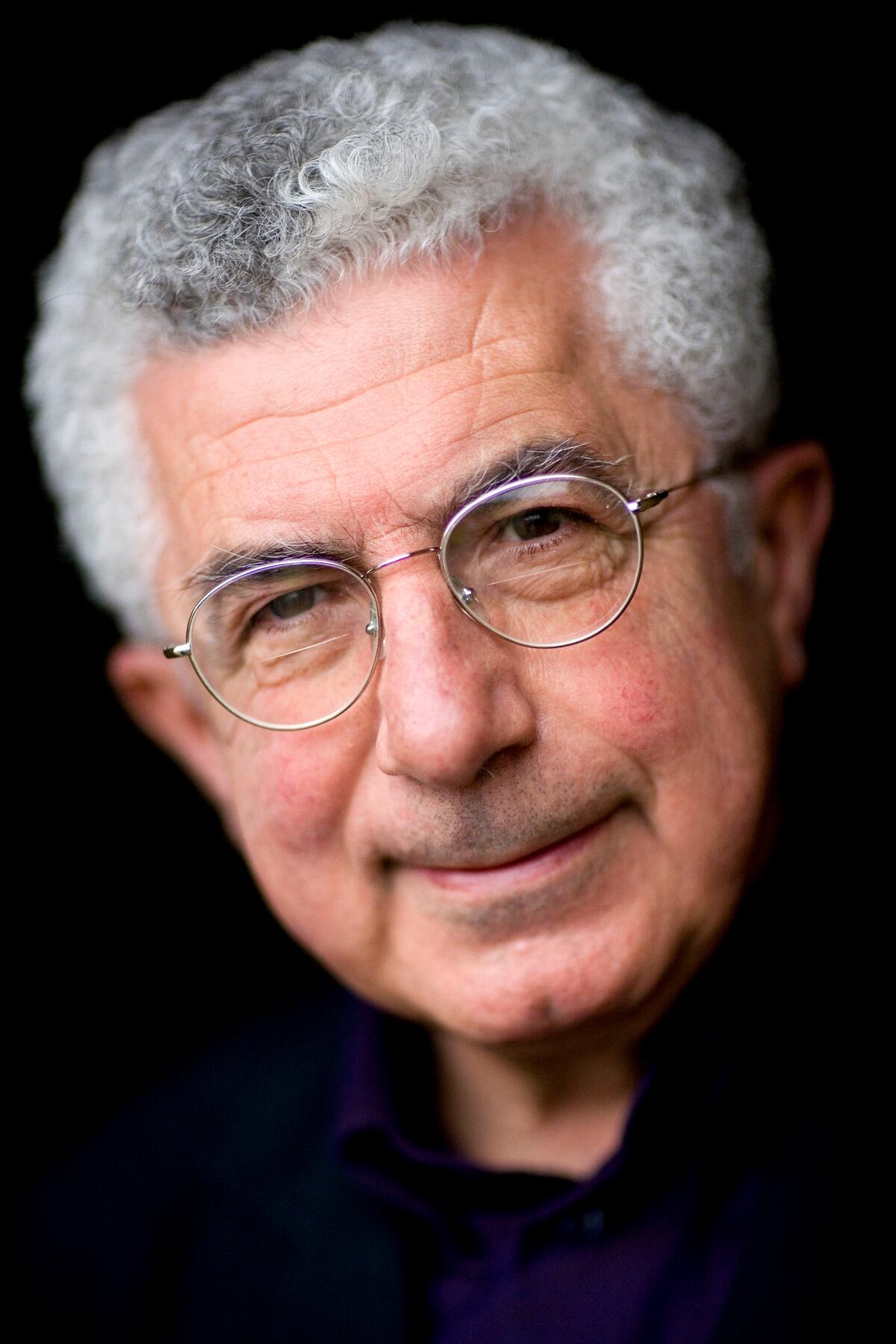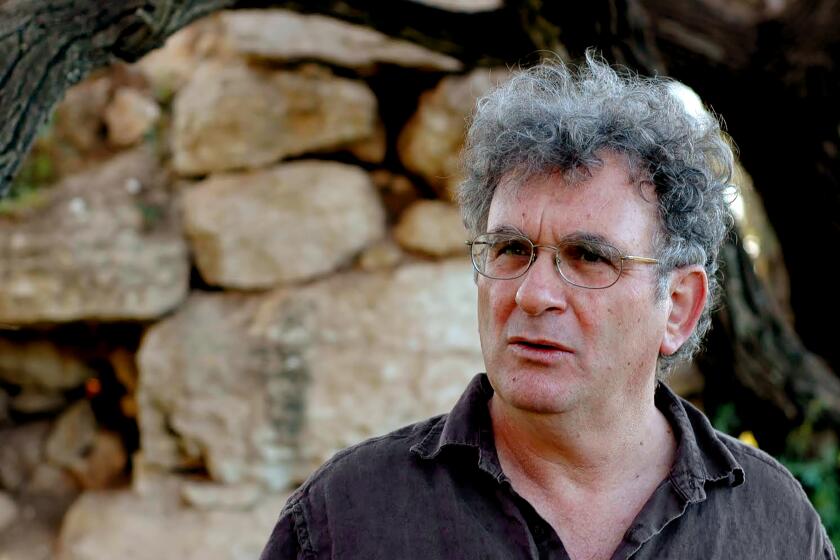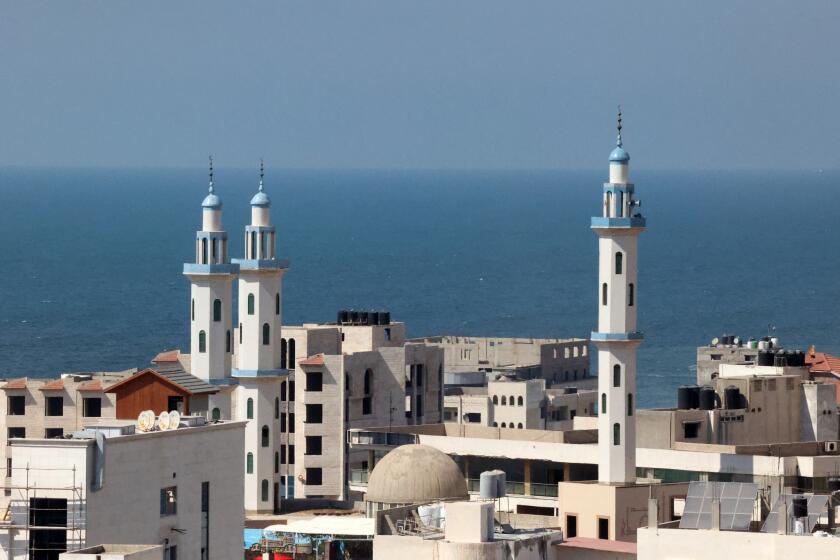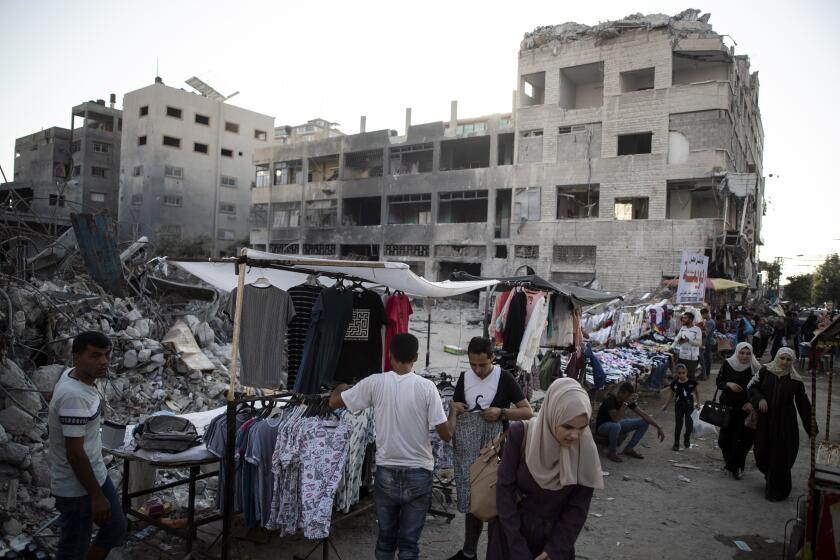The author of ‘The Iron Wall’ sees a ‘sinister’ precedent behind Israel’s actions in Gaza

- Share via
Arguing History
Author Avi Shlaim on the roots of the Israel-Hamas war
If you buy books linked on our site, The Times may earn a commission from Bookshop.org, whose fees support independent bookstores.
When Hamas invaded Israel on Oct. 7, the scale and savagery shocked the world. But the attack, as well as Israel’s ruthless response in Gaza, is less surprising in historical context: the intifadas of the 1980s and early 2000s, the 1967 war and ultimately the events surrounding Israel’s founding in 1948.
The Israel-Hamas war has created a vast divide — each side with its own set of arguments and sometimes impossible-to-prove facts. That isn’t just true of keyboard warriors or politicians; even historians within the same small movement can develop vastly different perspectives. If sorting out an objective truth feels hopeless, it’s still worth seeking points of convergence or, at the very least, stable terms of debate.
The Times is attempting to do that, beginning with two conversations with scholars once dubbed the “New Historians” — a loose group of Israeli revisionists who, in the 1980s, reexamined their country’s heroic origin story. As the interviews — one with Avi Shlaim, below, and the other with Benny Morris, which you’ll find here — make clear, there is no one answer to the same set of questions.
(The interviews were conducted before the start of a temporary cease-fire and hostage release.)
Even authors from the same school of Israeli history disagree on the war. We’ve spoken to two — for a start. Here: Benny Morris, author of ‘1948.’
Avi Shlaim — author of “Collusion Across the Jordan,” “War and Peace in the Middle East” and “The Iron Wall” — was born in Baghdad, but fled with his family to Israel from persecution that surged after 1948. As an adult he moved to England, where he has lived and taught for more than half a century.
Shlaim, 78, spoke by video from his home in England about the current war and how he believes it is shaped by the past. This interview has been edited for length and clarity.

The history of this land is riven by two incompatible narratives, Israeli and Palestinian. What can we definitively say about what happened in 1948?
After the war in 1948, the two winners were Israel, which expanded its territory beyond the borders of the U.N. Partition Plan, and King Abdullah of Jordan, whose army captured the West Bank, what was to be the heartland of the Palestinian state under the partition plan. [Israel would capture it in 1967.] The losers were the three-quarters of a million Palestinians — more than half the population — [who] became refugees during the Nakba. These are the true roots of the current conflict.
Noam Chomsky once said that settler colonialism is the most extreme and vicious form of imperialism. The Palestinians have had the misfortune to be at the receiving end of both Zionist settler colonialism and Western imperialism, first British and then American. The aim of the Zionist movement from the beginning was to have a Jewish state over as large an area as possible with as few Arabs inside its borders as possible.
Do Israelis and Palestinians see the current war in that context?
Benjamin Netanyahu said, we are fighting our “second War of Independence.” No one is challenging Israel’s independence or existence today. Why call it a Second War of Independence? I think the reason is a sinister one — the first War of Independence was accompanied by the Nakba (“The Catastrophe”) and now there are signs in leaked documents that the Israeli government is planning for a second mass expulsion [from Gaza]. History tells us that when Israel carries out ethnic cleansing as it did in 1948, it won’t allow the Arabs to come back.
And I think America is largely responsible for where we are now because of its blind support for Israel, which continues despite Israeli atrocities in Gaza.
We asked leading writers from a range of backgrounds to recommend books to help understand the Israel-Hamas war. Here are 14 titles to start with.
But Hamas has talked about creating a permanent state of war. Doesn’t that challenge Israel’s independence or existence?
People forget that in 2006 Hamas won a fair and free election, not just in Gaza but in the West Bank as well. They formed a government, but Israel refused to recognize it and so did the United States and United Kingdom and European Union; Israel engaged in economic warfare to undermine the Hamas government, and Israel’s European and American allies, to their eternal shame, joined Israel.
This is one of many examples of the utter hypocrisy of the Western powers. They say they believe in democracy and here was a shining example of Arab democracy in action, but the Western allies refused to recognize the result because the Palestinian people had chosen the wrong bunch of people.
The New Historians looked to break free from old ideas about the events of 1948. What misconceptions are there today?
The main misconception is that Hamas is the obstacle to peace. It has a terrible charter, and it had an extremist program, but after it came to power, it moderated its program and offered Israel a long-term cease-fire [as part of larger negotiations over territory and other issues in 2006 and again in 2015]. But Israel rejected it. So that’s one misconception — that Israel wants peace, and Hamas was stopping it. Israel is the obstacle to peace.
Another misconception is that Israel wanted a two-state solution. This is complete rubbish. It’s now fashionable to say the two-state solution is dead because of things like Israeli settlements in the West Bank, but I say the two-state solution was never born because no Israeli government since 1967 has offered a two-state solution that would be acceptable even to the most moderate Palestinian leader, and no American government has ever really pushed Israel into a two-state solution.
The Times’ newsletter head recommends six Palestinian memoirs, plus book awards by the numbers, Hollywood exposés and more in the Book Club Newsletter
You obviously have strong opinions. With this violent and tangled history and the current war, can any journalist or historian even be close to objective?
It’s very difficult to be objective because it’s such an emotive issue, and emotions are running very high on both sides now. But scholars can look at this conflict more or less objectively. Rashid Khalidi, a professor at Columbia, is the leading Palestinian historian of the conflict and we don’t differ that much fundamentally. We both see the essence of the conflict as being the Zionist settler colonial movement.
Your book “The Iron Wall” focused on Israel’s insistence on being unassailable. How does the Hamas attack change that perception within Israel?
Israel came to think of itself as invincible and Netanyahu thought, “We can do whatever we like on the West Bank, we can manage the situation in Gaza, and we can make peace with the Arab states without having to make any concessions to the Palestinians.”
But on the 7th of October, the whole of this policy collapsed overnight. And the whole of Israeli society has been unhinged by the experience. It was a truly traumatic experience. And now Israelis can’t think straight — they want the government to dismantle Hamas once and for all. But you can’t eradicate Hamas. Hamas is not a military organization. It’s a social movement, part of the fabric of Palestinian society.
Nathan Thrall explains what led him to ‘A Day in the Life of Abed Salama,’ which expands out from a bus accident to plumb injustice and dysfunction in Israel.
Is there any good solution you can see?
I wish I could see a light at the end of the tunnel but I’m utterly pessimistic.
More to Read
Sign up for our Book Club newsletter
Get the latest news, events and more from the Los Angeles Times Book Club, and help us get L.A. reading and talking.
You may occasionally receive promotional content from the Los Angeles Times.













